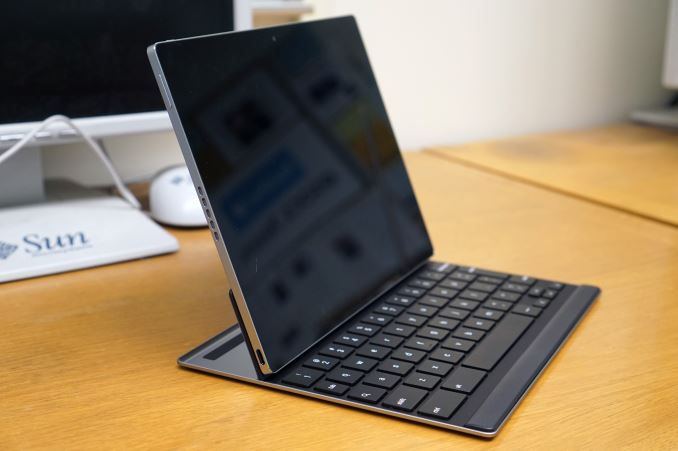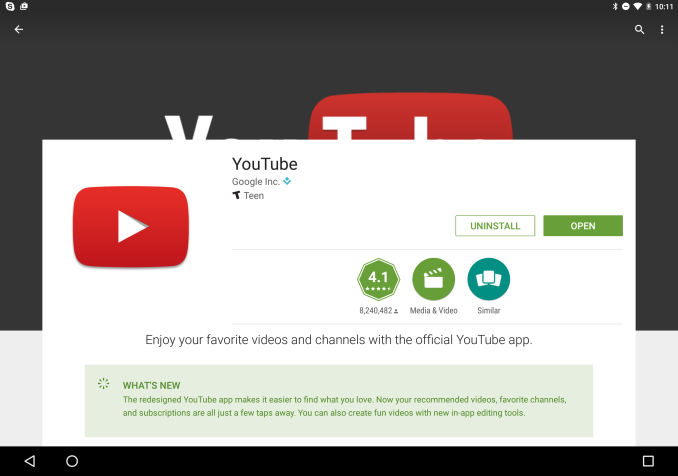The Google Pixel C Review
by Brandon Chester & Joshua Ho on January 25, 2016 8:00 AM ESTFinal Words
Ultimately, the Pixel C ends up being a strange mix of things that may have worked together in a much more cohesive manner had it shipped with Chrome OS like it was clearly intended to. Unfortunately, Android just doesn’t provide an acceptable tablet experience, and Google’s own applications are some of the biggest offenders. Before discussing that, it is worth going over the Pixel C’s hardware, as Google did a great job executing many of those aspects.
The Pixel C’s construction is solid. The build quality is superb, and it fits in well with the existing Chromebook Pixel. I definitely think the body is too heavy though, and the keyboard is far too heavy. I don’t think building tablet keyboards out of aluminum is the right way to go, even though it makes them feel very sturdy and fits well with an aluminum chassis. The mass ends up being too high compared to fabric and polymer keyboard covers, and keeping down the mass of the total package is essential to making a tablet highly portable.
As for the hardware, the first thing to talk about is the SoC. Tegra X1 is very fast on both the CPU and GPU sides, and as far as Android tablets go it offers the best graphics performance that you can get. The display on the Pixel C is also very good, with accurate color rendering and a high brightness as well as deep blacks. The greyscale accuracy could use some work, and Google needs to improve on hiding their digitizer and cutting down reflections in general, but for the most part it’s a very good panel.
Battery life on the Pixel C appears to be very good. It topped the charts in our web browsing, video playback, and BaseMark OS II battery tests. However software problems prevent me from investigating how long the battery lasts in a GPU-bound workload and a mixed workload, but for anything that primarily taxes the CPU or display it appears that the Pixel C provides best-in-class battery life.
Why does this UI show the exact same amount of info as the UI on a 4.5" phone?
Unfortunately, once you start looking at some of the other aspects of hardware and software, the problems with the Pixel C start appearing in great numbers. I’ve said this time and time again, but Android simply doesn’t offer a compelling tablet experience in any regard. With the Pixel C in particular you get a plethora of stability issues and bugs as well. Connectivity issues with Wi-Fi and Bluetooth impact the usability of the keyboard, and the entire software experience is simply unfinished. I can’t use it for very long without encountering touch input issues, freezes, and complete OS crashes. I really don't know how Pixel C shipped with the software in the state that it’s in, and it's just not acceptable. The fact that Josh also received a sample and encountered the same issues that I have confirms that they’re not specific to a single unit, and any single one of the major issues that we’ve noticed should have been enough to delay the Pixel C’s launch.
By this point I think people should know what they’re getting into when buying an Android tablet as far as the application situation goes, but the Pixel C’s problems go far deeper than that. I have been told that Google plans to issue an update that fixes the connectivity problems, touch input issues, and stability. Google has shipped me with a new unit that runs a pre-release version of this update, and Josh will be receiving his soon as well. Once that occurs, I'll be taking another look at it. That being said, the amount of time it has taken to address such show stopping bugs has been far longer than I would have expected, and if I was someone who purchased it I wouldn't be happy at all with the current situation.
At the very least, I think existing buyers should be given some public timeline of when Google plans to issue the much needed bug fixing updates. In its current state, I honestly can’t give the Pixel C any sort of recommendation, even to the biggest fans of Google products. Its software needs a lot of work, and I hope that Google's upcoming patch fixes the major problems. The Pixel C may improve with future updates, but for now it's best to hold off and see how things change going forward.












122 Comments
View All Comments
xthetenth - Monday, January 25, 2016 - link
I actually use the home screen a good bit on my phone but that's because I have a windows phone and it's actually useful. On tablets I'm more likely to use a broader and more varied set of apps and use the task switcher and apps list.Alexstarfire - Tuesday, January 26, 2016 - link
I use the home screen on my phone for just about everything really. I don't own a tablet but I can only imagine I'd do the same thing on it. I've got everything laid out on my home screen with folder(s) for grouping when necessary. Only time I go into the app drawer is to go to the gallery and to settings, and that's because I'm lazy and don't use them a whole lot. Task Switcher/Manager is used if I know the app I'm looking for was only used a couple apps ago. I'm not going to go scrolling through all my apps when it's easier to just go to the home screen and click the icon.Given that it's called the "Home Screen" I think you're not using your device to its potential if you are on your home screen so infrequently. To each his own though. :)
lilmoe - Monday, January 25, 2016 - link
This is a good iPad Pro competitor. But both aren't Surface competitors. Stop spreading stupidity.SaolDan - Monday, January 25, 2016 - link
Amen!osxandwindows - Monday, January 25, 2016 - link
I hope your joking.With all the problems and lack of apps, this can hardly be any sirius competition to the iPad pro.
Alexey291 - Saturday, January 30, 2016 - link
ipad pro? Wait wait someone actually compared ipad pro to a tablet? Oh boy.jjj - Monday, January 25, 2016 - link
lol i forgot that this thing exists.Google might as well give up instead of letting second graders do product design and Apple users set prices. Nobody has a decent tablet and they go on misguided explorations.
BrokenCrayons - Monday, January 25, 2016 - link
Android's problems and the overall lack of app quality are much more acceptable on a device that doesn't compete in higher price brackets. A $50 - 100 USD tablet are where glitches and errors like that belong rather than on something in the Pixel's price range. At that price, keeping productivity in mind as a primary usage scenario, it's probably a better idea to simply purchase a laptop.It's my personal opinion that Google's biggest mistake is fielding two distinctly different operating systems and then acting indecisively about which one to use on which product from the start. While Android is probably less elegant than Chrome, I think Google would help its own cause by abandoning Chrome and throwing that effort into making Android an OS that could operate effectively on phones, tablets, and small notebooks.
Murloc - Monday, January 25, 2016 - link
so basically converge like Microsoft did, only from an opposite place.We still have to see if that strategy works. Google has the advantage that everything started in their walled garden and so there's not the compatibility issues that microsoft has, they have a clean slate. But on the other hand, they'd have to make all the mouse and keyboard apps from scratch.
BrokenCrayons - Tuesday, January 26, 2016 - link
I don't think convergence is a good answer to the problem. In my opinion, there's very little of value that Chrome OS offers that's worth the effort of making the big muscle movements necessary to bring them over to Android. Having used x86 builds of Android on laptops previously, I think the shortcomings of the platform on notebook form factors become obvious when the user is compelled to make unusual gestures with a touchpad including things like clicking and dragging to scroll or being forced to deal with apps that rotate the screen without regard for the underlying platform. The former is something that needs a little work from Google in the gesture support department while addressing the latter is up to individual app developers to resolve. Having used several bluetooth keyboards paired to Android phones (along with the aforementioned x86 Android builds) in an effort to minimize the size and intrusiveness of computing tasks while improving flexibility through mobility, I argue that keyboard and mouse support is already pretty close to good enough based on my experiences and that very little work is required to get Android whipped into shape for laptop usage.In fact, all I'm really advocating is that Google dump Chrome OS because it seems like its mere existence is holding back development of Android. Simply tossing the entire thing into the trash and moving on is probably the best way to address the dysfunctions within the company over what OS to use on which device.